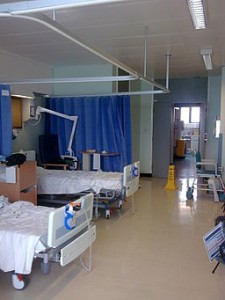ER Economics: The UK Market for Health Care
 It has become a tired and inaccurate cliche that Britain boasts the best health service in the world – free at the point of delivery. The truth is that the NHS is collapsing under the weight of demand and inadequate provision of centrally provided funding, drawn from general tax revenue. There exists a shortfall in the NHS budget for this year of £2 billion. In addition, the government requires a £30 million saving by 2015, at a time when there is a 4-5% increase in demand. GP’s have seen their funding cut and many health trusts are experiencing serious financial deficits.
It has become a tired and inaccurate cliche that Britain boasts the best health service in the world – free at the point of delivery. The truth is that the NHS is collapsing under the weight of demand and inadequate provision of centrally provided funding, drawn from general tax revenue. There exists a shortfall in the NHS budget for this year of £2 billion. In addition, the government requires a £30 million saving by 2015, at a time when there is a 4-5% increase in demand. GP’s have seen their funding cut and many health trusts are experiencing serious financial deficits.
Over the past few decades the demand for health care has risen exponentially. The causes are easy to list: a rapidly ageing population and extended life-spans; rising costs of innovative treatments, the mass production and marketing of unhealthy foods. Some 70% of all NHS expenditure is used to treat the long-term consequences of unhealthy consumption and life-style choices.
Free at the point of delivery is also a problem. The cost of treatment is met out of general taxation, which we pay over the course of our working life, not directly by each patient receiving medical treatment, as is the case in other markets, and so the actual impact of rising costs does not impact on the individual in anything like the way rising costs in other markets do.
Because health provision is massively labour intensive, innovative technology and staff cut-backs have only a limited impact on costs of maintenance, and introduce more costs dealing with super-bug infestation. The enforced employment of bank nurses at weekends and in the evening to cover dangerously inadequate staffing levels erodes financial savings. A significant number of junior doctors and nurses are reluctant to work in the NHS, preferring to either leave medicine on qualification or move abroad to Australia and New Zealand, where work conditions are infinitely more attractive.
Government is now urgently considering new methods of paying for the NHS. One cross party scheme has been the suggestion that the costs of health care should be transferred to national insurance payments. To cover the present deficit in the health budget would mean a 1p in the pound rise in national insurance payments and a cost to national insurance might trigger increased unemployment and would be unpopular with the electorate and the main political parties approaching an election. Unemployment payments would rise. So should patients be asked to pay at least a nominal sum for medical consultation? The Royal College of Nurses has recently rejected such a suggestion.
Could we switch to a continental system of health insurance? This would take 20 – 30 years to embed itself and would hit household incomes severely during the transition period from one system of payment to another. Wage rates are too low in the UK to make this universally acceptable.
Perhaps the solution is the creation of a dedicated NHS fund ring-fencing tax revenue from the sale of tobacco products, alcohol, sugar, processed red meats and gambling, and thus strike at the heart of the causes of 70% of our health problems.